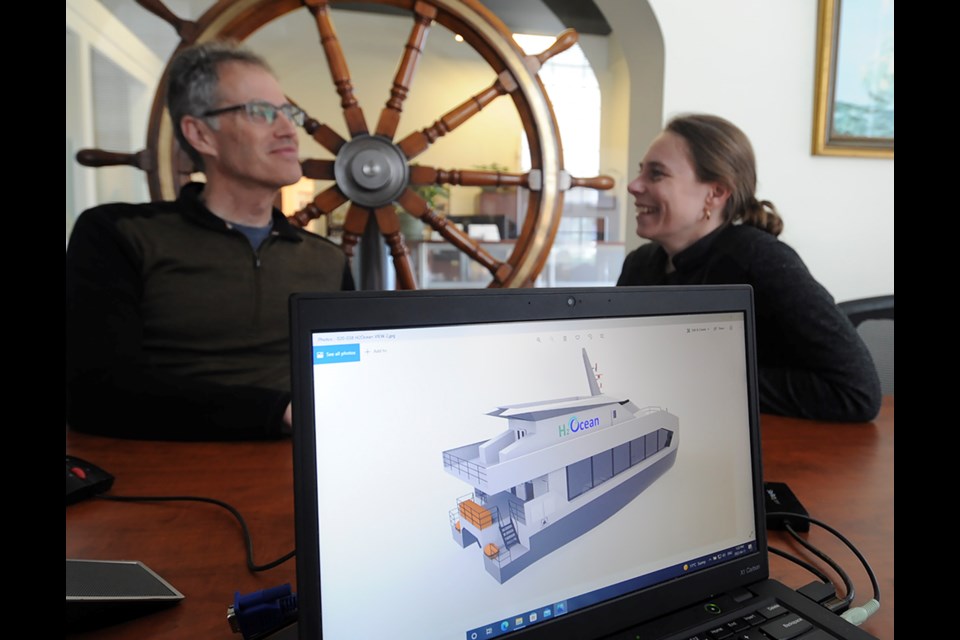A North Vancouver maritime firm is hoping to launch the country’s first ever hydrogen-fuelled vessel.
Capilano Maritime Design has received a $178,000 grant from CleanBC Go Electric Advanced Research and Commercialization program to introduce the proof-of-concept in the form of a recreational harbour cruise boat.
“It's essentially new,” said Chris Mulder, Capilano Maritime president. “There currently aren't any vessels in Canada that use hydrogen as a marine fuel.”
Unlike internal combustion engines, which burn petrochemicals and release carbon, Mulder’s vessel will have a fuel cell electric hybrid propulsion system, which converts the hydrogen energy to electricity and emits only water vapour as a byproduct.
The boat Capilano Maritime engineers are working on will be a 24-metre catamaran with two 200-kilowatt fuel cells, which will help power twin 250-horsepower electric motors. A full tank of hydrogen should give it a range of 150 nautical miles, although it will mostly be used for pleasure cruises around the harbour. The cat can set up for a dinner cruise or cocktail party with a capacity of up to 194 people. Mulder said they chose a harbour cruise vessel specifically because they wanted something where the public would get to see the new technology in action.
“As a company, we're just very interested in finding solutions to climate change. We're doing our part and trying to push that forward as quickly as possible,” he said.
But, hydrogen fuel is new to naval architects and regulators alike. Because it is a flammable gas, special care and attention is being placed on how it is stored in tanks on the boat. The hope is to have all regulatory hurdles with Transport Canada and Lloyd’s Register cleared by this summer, Mulder said. After that, they are aiming to see the H-powered vessel on the H2O within the next two years.
Hydrogen itself may be carrying a hidden carbon footprint, as some forms of hydrogen require large amounts of fossil fuel to be produced. But Mulder said they see great potential for hydrogen to become the zero-emission power source of choice for the industry.
“For the marine vessels that are going to be working day-in, day-out, it's going to make a lot more sense than a battery vessel, as the recharge or the refuel time is much faster and the amount of weight you have to carry around is a lot less,” he said.
There are no major regulations coming down the pipes that will force the marine industry to decarbonize, Mulder said. Capilano Maritime is pursuing the project now “to prove that it can be done and show the desirability of it.”
“Hopefully the regulations will follow,” he added.
Partnered on the project is North Vancouver-based HTEC, which will provide the hydrogen fuel, Ballard Power Systems Inc., Canal Marine & Industrial Inc., the Canadian Hydrogen and Fuel Cell Association, Lloyd’s Register Group Services Limited, Fairweather Cruises & Events, and the University of British Columbia.
North Vancouver’s two NDP MLAs welcomed the company’s addition to the province’s zero-emission research and development program.
“Their world-leading efforts to decarbonize this sector will reduce climate pollution, create new jobs for people in our community and move us toward a more sustainable future for everyone,” said North Vancouver-Seymour MLA Susie Chant, in a release.
“Transportation accounts for well over a third of greenhouse gas emissions produced in British Columbia, and the need for a rapid transition away from fossil fuels toward clean, renewable energies has never been more evident. I’m pleased to know that funding from CleanBC will allow Maritime Capilano to continue developing ways to decarbonize marine travel,” added North Vancouver-Lonsdale MLA Bowinn Ma.


